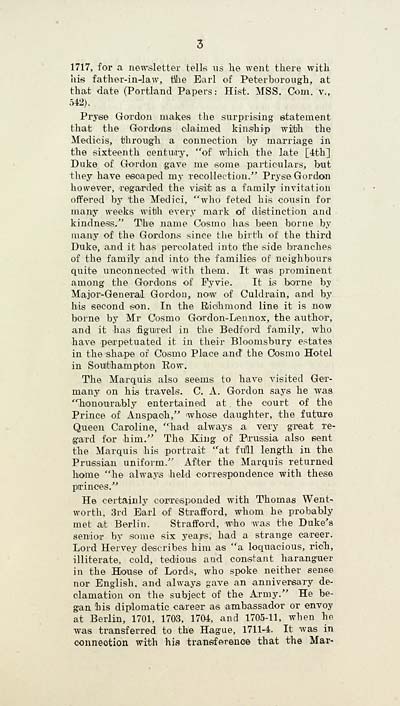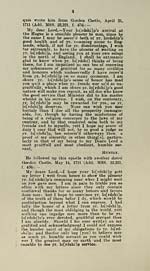Download files
Complete book:
Individual page:
Thumbnail gallery: Grid view | List view

1717, for a newsletter tells us lie went there with
his father-in-law, tihe Earl of Peterborough, at
that date (Portland Papers: Hist. MSS. Com. v.,
542).
Pryse Gordon makes the surprising statement
that the Gordons claimed kinship with the
Medicis, through a connection by marriage in
the sixteenth century, "of which the late [4th]
Duke of Gordon gave me some particulars, but
they have escaped my recollection." Pryse Gordon
however, regarded the visit as a family invitation
offered by the Medici, "who feted his cousin for
many weeks with every mark of distinction and
kindness/' The name Cosmo has been borne by
many of the Gordons since the birth of the third
Duke, and it has percolated into the side branches
of the family and into the families of neighbours
quite unconnected with them. It was prominent
among the Gordons of Fyvie. It is borne by
Major-General Gordon, now of Culdrain, and by
his second son. In the Ricihniond line it is now
borne by Mr Cosmo Gordon-Lennox, the author,
and it has figured in the Bedford family, who
have perpetuated it in their Bloomsbury estates
in the shape of Cosmo Place and the Cosmo Hotel
in Southampton Row.
The Marquis also seems to have visited Ger-
many on his travels. C. A. Gordon says he waa
"honourably entertained at the court of the
Prince of Anspaoh," whose daughter, the future
Queen Caroline, "had always a very great re-
gard for him." The King of Prussia also sent
the Marquis his portrait "at full length in the
Prussian uniform/' After the Marquis returned
home "he always held correspondence with these
princes/'
He certainly corresponded with Thomas Went-
worth, 3rd Earl of Strafford, whom he probably
met at Berlin. Strafford, who was the Duke's
senior by some six years, had a strange career.
Lord Hervey describes him as "a loquacious, rich,
illiterate, cold, tedious aud constant bar angrier
in the House of Lords, who spoke neither sense
nor English, and always gave an anniversary de-
clamation on the subject of the Army." He be-
gan 'his diplomatic career as ambassador or envoy
at Berlin, 1701, 1703, 1704, and 1705-11, when he
was transferred to the Hague, 1711-4. It was in
connection with his transference that the Mar-
his father-in-law, tihe Earl of Peterborough, at
that date (Portland Papers: Hist. MSS. Com. v.,
542).
Pryse Gordon makes the surprising statement
that the Gordons claimed kinship with the
Medicis, through a connection by marriage in
the sixteenth century, "of which the late [4th]
Duke of Gordon gave me some particulars, but
they have escaped my recollection." Pryse Gordon
however, regarded the visit as a family invitation
offered by the Medici, "who feted his cousin for
many weeks with every mark of distinction and
kindness/' The name Cosmo has been borne by
many of the Gordons since the birth of the third
Duke, and it has percolated into the side branches
of the family and into the families of neighbours
quite unconnected with them. It was prominent
among the Gordons of Fyvie. It is borne by
Major-General Gordon, now of Culdrain, and by
his second son. In the Ricihniond line it is now
borne by Mr Cosmo Gordon-Lennox, the author,
and it has figured in the Bedford family, who
have perpetuated it in their Bloomsbury estates
in the shape of Cosmo Place and the Cosmo Hotel
in Southampton Row.
The Marquis also seems to have visited Ger-
many on his travels. C. A. Gordon says he waa
"honourably entertained at the court of the
Prince of Anspaoh," whose daughter, the future
Queen Caroline, "had always a very great re-
gard for him." The King of Prussia also sent
the Marquis his portrait "at full length in the
Prussian uniform/' After the Marquis returned
home "he always held correspondence with these
princes/'
He certainly corresponded with Thomas Went-
worth, 3rd Earl of Strafford, whom he probably
met at Berlin. Strafford, who was the Duke's
senior by some six years, had a strange career.
Lord Hervey describes him as "a loquacious, rich,
illiterate, cold, tedious aud constant bar angrier
in the House of Lords, who spoke neither sense
nor English, and always gave an anniversary de-
clamation on the subject of the Army." He be-
gan 'his diplomatic career as ambassador or envoy
at Berlin, 1701, 1703, 1704, and 1705-11, when he
was transferred to the Hague, 1711-4. It was in
connection with his transference that the Mar-
Set display mode to:
![]() Universal Viewer |
Universal Viewer | ![]() Mirador |
Large image | Transcription
Mirador |
Large image | Transcription
Images and transcriptions on this page, including medium image downloads, may be used under the Creative Commons Attribution 4.0 International Licence unless otherwise stated. ![]()
| Histories of Scottish families > 2nd Duke of Gordon and the part he played at the battle of Sheriffmuir > (5) Page 3 |
|---|
| Permanent URL | https://digital.nls.uk/91798982 |
|---|
| Description | A selection of almost 400 printed items relating to the history of Scottish families, mostly dating from the 19th and early 20th centuries. Includes memoirs, genealogies and clan histories, with a few produced by emigrant families. The earliest family history goes back to AD 916. |
|---|

